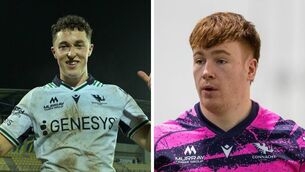Ireland eye historic three-in-a-row feat

Ireland's Calvin Nash and Caelan Doris in action during last year's Guinness Six Nations encounter at the Aviva Stadium against Scotland. The Boys in Green will look to complete three consecutive triumphs this year. Picture: INPHO/Dan Sheridan
Chicago Bulls. Real Madrid. Australia. Green Bay Packers.
Three in a row.
It's a phrase that defines the greats and echoes through the halls of sporting immortality. Michael Jordan's Bulls dominated the NBA with two three-peats in the 1990s. Zinedine Zidane's Real Madrid rewrote the Champions League record books with their unprecedented triumphs from 2016 to 2018. The Australian cricket team set a benchmark in the sport by winning three consecutive ICC Cricket World Cups in 1999, 2003, and 2007. And Vince Lombardi's Packers captured three consecutive NFL championships, including the first two Super Bowls, in the 1960s.
Of course, other sides have gone further. The three-in-a-row nevertheless remains the threshold for greatness - the moment when a team transcends success and enters the realm of dynasties. Anything that comes after that moment is merely a bonus. Winning one title proves you're good. Winning two suggests consistency. But three? That's when a side leaves no doubt about its place in history. It requires everything to align - talent, depth, leadership, and an unyielding resistance to complacency. That's why the three-in-a-row is rare, and why it stands as the truest test of greatness in sport.
Ireland now stands on the cusp. With back-to-back Six Nations titles already secured, they have the opportunity to claim an elusive third, a feat no team has achieved since France's run between 1986 and 1989 though two of those four titles were shared.
Still, sustained success demands more than just talent. It requires an unwavering focus under the heaviest of pressures. Simon Easterby’s first squad as interim Ireland head coach is a portrait of stability, with just one uncapped player - Leinster prop Jack Boyle - breaking into the 36-man panel. In many ways, it’s exactly what you’d expect from a team preparing to defend a Six Nations crown while navigating the absence of Andy Farrell, who is on sabbatical with the British and Irish Lions. Easterby, stepping into the breach, hasn’t reinvented the wheel, nor did anyone expect him to.
This is a squad that screams continuity, with Mayo man Caelan Doris set to captain a group brimming with familiar faces. But Easterby also nodded to the future by including four development players - Hugh Cooney, James McNabney, Ben Murphy, and Cathal Forde - ensuring that while the focus is on retaining the Six Nations title, there’s an eye on the years to come.
The task ahead is daunting. Ireland opens their campaign against England at the Aviva Stadium, a fixture Easterby acknowledged as one that will “sharpen minds” and leave no room for a slow start. If Ireland is to embark on a historic three-in-a-row journey, the side will need to hit the ground running and deliver from the outset. More then ever, every match will become a cup final.
The smallest slip can derail a Six Nations campaign. And the challenges posed by their opponents are formidable, each bringing unique strengths and recent form into the 2025 Championship.
England, under head coach Steve Borthwick, appear to have made it through their period of transition. Their 2024 campaign was marked by inconsistency, though they eked out a narrow victory over Ireland to deny them a Grand Slam. The side's blend of emerging talent and seasoned players makes them unpredictable, capable of brilliance but susceptible to lapses. But they will pose a significant challenge, as they always do..
France finished second in the 2024 Six Nations, but have since seemed to improve following an unbeaten run during November. With the return of key players like Antoine Dupont and a cadre of young talent, they have the capability to disrupt any side. Having only two titles since 2010 is a poor return for a country with the country's tradition - that substandard record makes them a menacing prospect. They will arrive in Dublin like a spurned lover, ready to splash a glass of their finest Bollinger across Ireland's face before storming out in a haze of drama and indignation.
Scotland have also demonstrated significant progress in recent seasons, with notable victories that underscore their growing competitiveness. But time is running out on their gold generation, a reality that won't be lost on some of the country's more senior players as they embark on another championship. Their ability to challenge top-tier teams nevertheless cannot be underestimated.
And for all the brilliance and hard graft that has gone into Ireland’s Six Nations triumphs, there’s no escaping the role luck plays. Rugby has a habit of turning on the smallest margins, and Ireland’s recent history is littered with moments where luck has tipped the scales in their favour.
In their final match of the 2009 championship against Wales, Stephen Jones lined up a penalty to snatch victory for the Welsh in the final seconds. For all his reliability, Jones’ kick fell short and the beginning of Ireland's golden era commenced.
Fast forward to 2018, and another Grand Slam hung by a thread. France led by one point deep into injury time in Paris, before Johnny Sexton orchestrated one of the most dramatic finales in Six Nations history. A 41-phase driven culminated in a drop goal attempt from halfway that defied logic and physics. It was the type of kick the Leinster man probably never even attempted on the training pitch, and yet he still stunned the Parisian crowd.
In the final game of Ireland’s 2023 campaign, the game turned on a controversial red card for Freddie Steward just before half-time, a decision that sparked a fiery debate. Reduced to 14 men, England could only hold back Ireland’s charge for so long in the second half. Had England retained 15 men on the field, Ireland's night may have not been quite so celebratory.
Luck, of course, doesn’t diminish any of these achievements. Instead, it enhances the mythology. The finest teams exploit fortune, turning breaks into glory. As Ireland embark on their quest for a third consecutive Six Nations title, they’ll need more than talent and preparation. They’ll need the bounce of the ball, the favour of the rugby gods, and maybe a divine gust of wind to blow in their favour.
It's that ability to conjure a sprinkle of magic that turns fine teams into greats. And Ireland will need to find more again if they are to realise their finest achievement yet.



